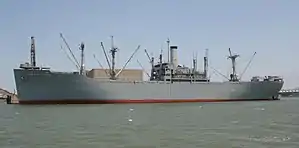SS William and Mary Victory
The SS William and Mary was a Victory ship built during World War II.
 A Typical Victory Ship. | |
| History | |
|---|---|
| Name: | SS William and Mary |
| Namesake: | College of William & Mary |
| Owner: | War Shipping Administration |
| Operator: | International Freighting Company |
| Builder: | Bethlehem Steel *Fairfield Shipyard, Inc. |
| Laid down: | 1945-3-6 |
| Launched: | 1945-04-20 |
| Christened: | 1945-04-20 |
| Completed: | 1945-5-15 |
| Commissioned: | Troopship |
| Fate: | Sold in 1947 |
| History | |
| Name: | SS Mendoza 1947 |
| Owner: | Compana Argentina de Nav.Dodero, |
| Operator: | Compana Argentina de Nav.Dodero, |
| Reclassified: | Commercial Cargo Ship |
| Fate: | Sold in 1947 |
| History | |
| Name: | SS Mendoza 1947 |
| Owner: | Flota Argentina se Nav. de Ultramar |
| Operator: | Flota Argentina se Nav. de Ultramar |
| Recommissioned: | 1952 as Commercial passenger ship |
| Fate: | Sold in 1949 |
| History | |
| Name: | SS Mendoza 1949 |
| Owner: | Empresa Lineas Maritimas Argentinas |
| Operator: | Empresa Lineas Maritimas ArgentinasUltramar |
| Recommissioned: | Commercial Cargo Ship 1961 |
| Fate: | 1972 scrapped at Campana, Buenos Aires, Argentina |
| General characteristics | |
| Displacement: | 7725 tons (light displacement) |
| Length: | 139 m (456 ft) |
| Beam: | 18.9 m (62 ft) |
| Draft: | 7 m (23 ft) |
| Propulsion: | Westinghouse steam turbines, single shaft, 8500 horsepower (6.3 MW) |
| Speed: | 17.5 knots (32.4 km/h) maximum sustained, 21 knots emergency |
| Range: | 12,500 nm at 12 knots |
| Complement: | 62 Merchant Marine and 28 US Naval Armed Guards as Victory ship. *358 officers and men |
| Armament: |
|
| Aircraft carried: | none |
| Aviation facilities: | none |
| Notes: | [1] |
Service life
SS William and Mary Victory was part of the series of Victory ships named after educational institutions, in this case the College of William and Mary. Her design type was VC2-S-AP2/WSAT. Her Maritime Commission (MCV) hull number was 652 and her shipyard number was 1597. She was built by Bethlehem Shipbuilding Corporation in Baltimore, Maryland.[2]
She was launched and christened on 20 April 1945. Her sponsor was Eleanor Harvey, the retiring president of the Women Students' Cooperative Government Association at the College of William and Mary and a member of the class of 1945. U.S. Naval Air Corps Lieutenant Robert Eastman, an alumnus of the College, pushed the button that released the ship into the water. Edie Harwood, president of the Women Students' Cooperative Government Association, was Harvey's maid of honor.[3]
SS William and Mary Victory served in the Atlantic Ocean in WW2. She severed as a troop ship take troop to Europe. On April 17, 1946 she departed Le Havre, France for New Jersey, bring home troops. On January 25, 1946 she streamed in to New York bring troop home.[4] SS William and Mary Victory arrived in New York from Antwerp on February 26, 1946, with 1.457 troops, including 381st Engineer Combat Battalion and 34Sth Engineer Combat Battalion.[5][6][7] SS William and Mary Victory and 96 other Victory ships were converted to troop ships to bring the US soldiers home as part of Operation Magic Carpet.[8][9][10][11][12]
After WW2 in 1946 she was laid up in the James River. In 1947 she was sold to Compana Argentina de Nav.Dodero, in Buenos Aires, Argentina and renamed Mendoza. In 1949 she was sold to Flota Argentina se Nav. de Ultramar in Buenos Aires. In 1952 she was rebuilt as a passenger ship with accommodation. In 1961 she was sold to Empresa Líneas Marítimas Argentinas, in Buenos Aires, converted back to a to cargo ship. In 1972 she was scrapped at Campana, Buenos Aires, Argentina.
Artifacts
The christening bottle for the SS William and Mary Victory is in the Special Collections Research Center (SCRC) in Swem Library at the College of William and Mary.[13] An American flag that was flown on the ship is also available in the SCRC. The flag was a gift of Captain James Hassell on May 2, 1946.
See also
- Liberty ship = Previous cargo ship.
- List of Victory ships
- Type C1 ship
- Type C2 ship
- Type C3 ship
References
- Babcock & Wilcox (April 1944). "Victory Ships". Marine Engineering and Shipping Review.
- "Victory Ships by shipyard". Retrieved 2006-08-10.
- "Harvey Christens W-M Victory Ship". (April 25, 1945). The Flat Hat, Volume XXXIV, No. 22, pp. 2. PDF Scan
- Democrat and Chronicle from Rochester, New York · Page 22, January 26, 1946
- The Daily Notes from Canonsburg, Pennsylvania · Page 2, February 26, 1946. Many of the troops were taken to Camp Shanks or Fort Hamilton or Camp Kilmer to be processed for discharge.
- Interesting Times: An Encounter With the 20th Century 1924, By George Mandler
- Armed-guard, troop ships
- ww2troopships.com crossings in 1945
- Troop Ship of World War II, April 1947, Page 356-357
- Our Troop Ships
- Milford W. Crumplar, Corporal
- Lud Lekson Collection
- Christening bottle, 8 August 2007, Gift of Mrs. Eleanor Rennie, Special Collections Research Center, Swem Library, College of William and Mary JPEG image.